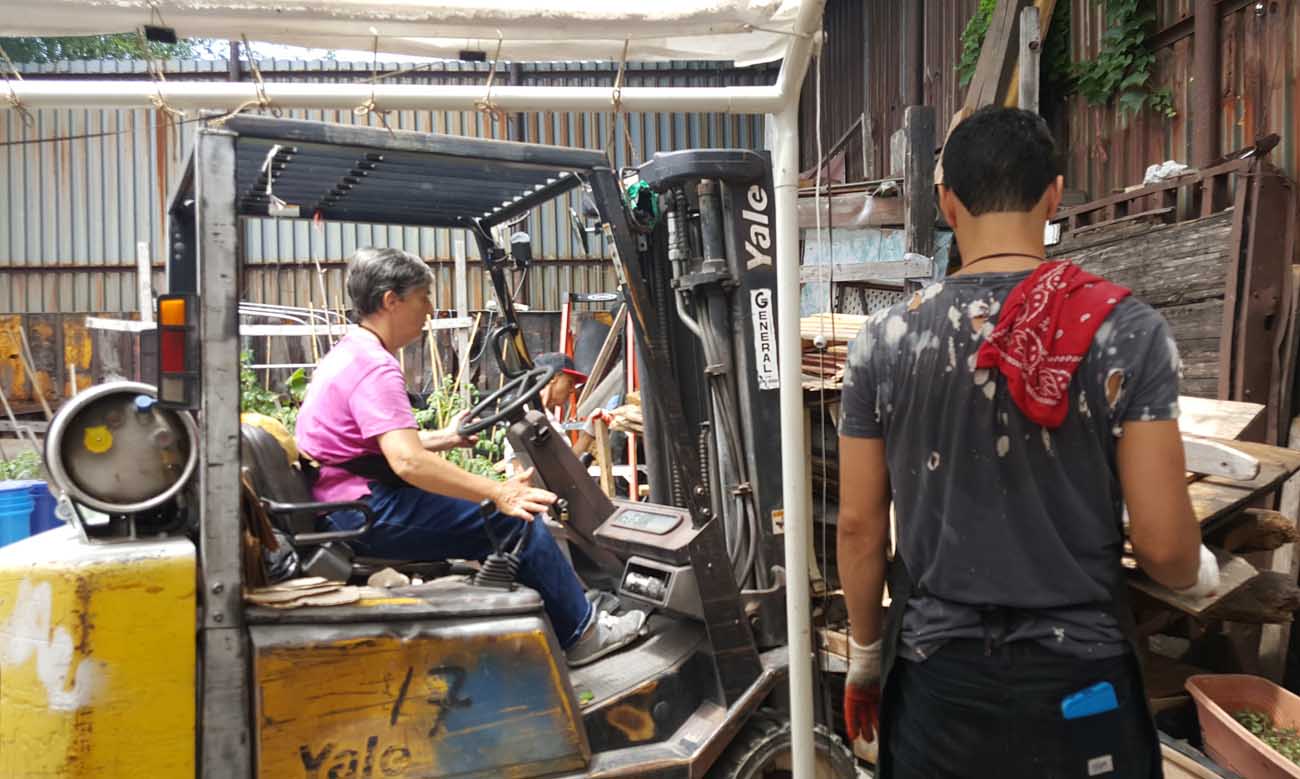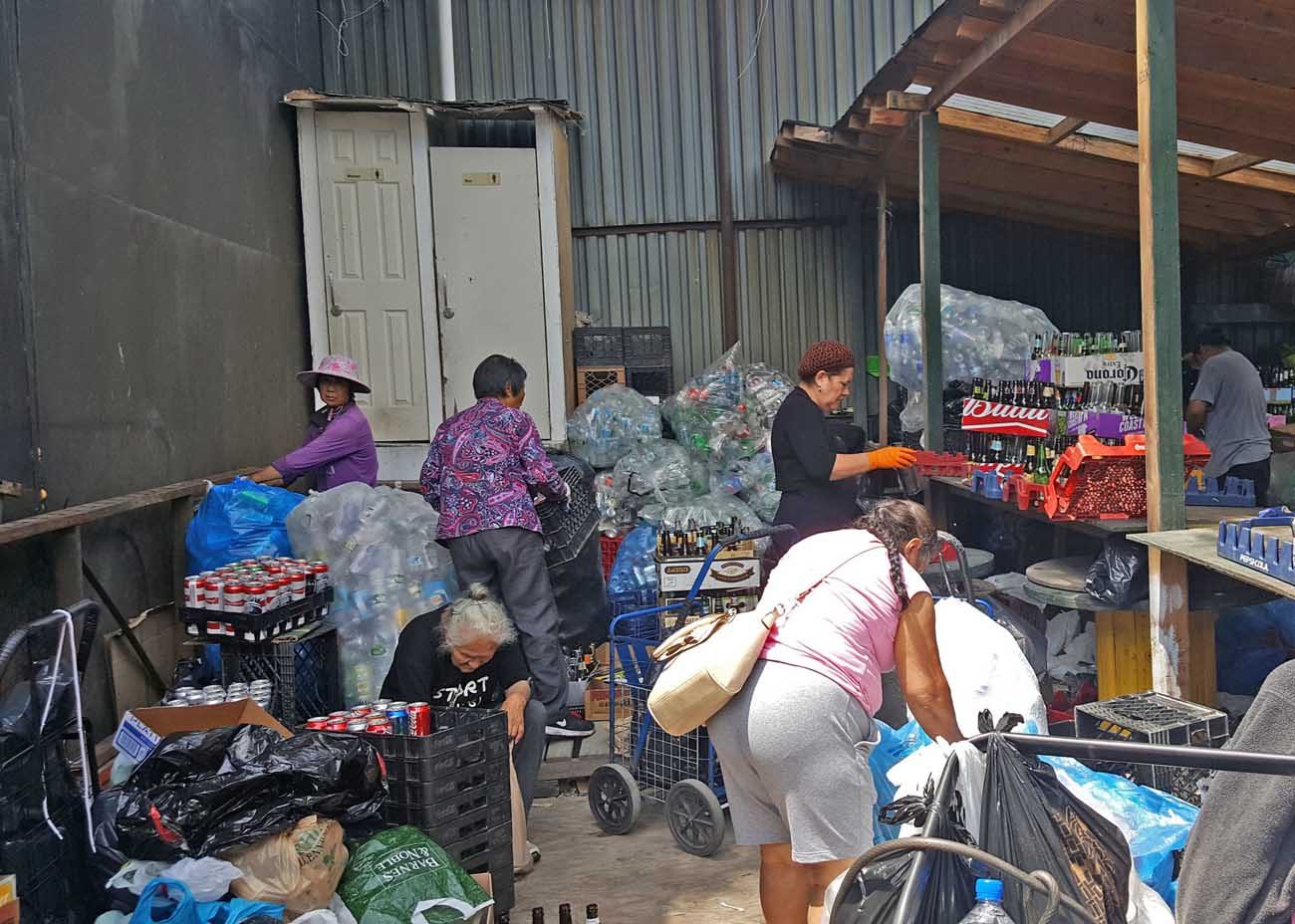BROOKLYN, N.Y. (CNS) — Her gloved hands deep in buckets of fruit pieces, vegetable peels and other food dreck, Sister Ana Martinez de Luco flashes a smile as she mixes what will become Sure We Can’s own brand of compost.
She then tosses clear plastic bags bulging with cans into piles that tower above her head. She hops on a forklift to move wooden pallets, clearing a new spot for the vegetable garden sprouting in an industrial site in Brooklyn.
And as she weaves her way around bins, bags and crates, she greets each of the more than a dozen people — often known as “canners” — who are there to count, sort and redeem what they’ve collected from the endless stream of cans and bottles that New Yorkers discard.
[hotblock]
As the only nonprofit redemption center in New York City, Sure We Can is an economic lifeline for more than 400 canners. They can cash in what they’ve gathered — in small amounts or bulk — for the state-mandated 5 cents per piece, or they can earn a bit more by counting and sorting, which helps Sure We Can reduce its costs.
The organization, co-founded in 2007 by Sister Ana and Eugene Gadsden, has become a community. Canners serve on its board of directors, and intertwined with Sure We Can’s mission of promoting environmental sustainability is helping its clients feel supported and respected.
With contagious enthusiasm, Sister Ana describes big plans for Sure We Can.
“Here is where the garden will go,” she said, pointing to a concrete slab. A classroom will take shape where the garden is now for field trips, classes and theater groups in which students learn about environmental responsibility and sustainability. A rainwater collection system provides water for the squash, tomatoes and other plants. The composting system, used on Sure We Can’s own garden the last four years, will soon package fertilizer for sale.

Sister Ana Martinez de Luco drives a forklift June 27 at the Sure We Can redemption and recycling center in Brooklyn, N.Y. (CNS photo/Gail DeGeorge, GSR)
Sister Ana is on a mission — and on a deadline. On July 31, Sure We Can planned to kick off a campaign to raise $3 million in 18 months to buy its current location in Brooklyn, the organization’s fifth home in 10 years, which it has been renting since 2010.
July 31 also is to be the day that Sure We Can says farewell to Sister Ana as she turns the organization over to Agustina Besada, who earlier this month became executive director after serving as a volunteer and board president. Sister Ana planned to take a few months off then return as a volunteer.
Sister Ana credits the start of Sure We Can to her partnership with co-founder Gadsden, the “king of canners” who taught her the fine points of can-collecting more than a decade ago.
In 2004, she was working in New York at UNANIMA, a nongovernmental coalition of 20 congregations of Catholic sisters that aims to educate United Nations policymakers on issues concerning women and children living in poverty; immigrants and refugees; and the environment. She felt a call to serve the poor more directly.
“I found meaning in doing (U.N. work), but my personality — my gift is just to work with people and to share life with people, especially people who are in need,” she said. “To go in the streets at the same time I was going to the U.N. helped me keep my feet on the ground.”
She had grown up in a small village in the Basque area of Spain, entered religious life at age 19 as a Carmelite Sister of Charity and had spent much of her life working in social services in the Philippines. (She became part of the Sisters for Christian Community in 2014.)
“I felt strongly the invitation to share my life with the people in the street but didn’t really implement it” in the Philippines, she said. “When I came to the U.S., that pull was very much alive. This was the place. It was a faith issue, to share my life with them.”
She volunteered with an organization serving the homeless and began canning as a way to earn a bit of money and, more importantly, the trust of those she wanted to help.
“The fact that I started picking up cans helped me to enter faster the community of people in the street,” she said. “I was no longer a strange figure but showed them that I was doing what they were doing, so they thought I must be in great need.”
A mutual friend introduced her to Gadsden, who had taught dozens to can efficiently. He worked with Sister Ana for months before learning she was a woman religious.
“I’ve believed in God all my life, and maybe it’s a good thing that I ran into a sister — a good thing and a God-thing,” Gadsden said.
[hotblock2]
In 2005, a cash-in center closed, leaving canners in Manhattan without an easy way to redeem what they collected. Retailers would take some cans and bottles, but it wasn’t practical for canners to visit multiple sites.
Sister Ana and Gadsden talked of the need for a new large-scale redemption center. They approached various companies and organizations with no success. After one particularly disappointing meeting, she said Gadsden reassured her, “When one door is closed, another door is opened.”
Her work at the U.N. for UNIMA and another nongovernmental organization, Partnership for Global Justice, helped open the door to assist those on the street. After Sister Ana told the sisters there about the issue with the redemption center, one arranged a meeting with a friend who was a Wall Street financier. He put Sister Ana in contact with an attorney to draw up incorporation papers in 2007.
They recruited board members. At first, Sister Ana was reluctant to join the board, worrying that it would separate her from the canning community. But when she and Gadsden realized they needed to have canners on the board so that their needs and views were represented, they also joined. Sure We Can’s board now has canner representatives as part of its structure, one from each of the primary language-speaking communities — Spanish, Chinese and English — of people who form its clientele.
Sure We Can first opened in a public storage area in Manhattan in 2008. But the site was close to the upscale shops and wealthy residences of Fifth Avenue, and neighbors blamed Sure We Can for attracting homeless people to the area. A series of moves followed — until 2009, when it found its current spot in Brooklyn, nestled near a school and alongside other industrial operations.
The grass-roots #60MillionCans fundraising drive kicking off July 31 is to convince individuals, buildings, schools and businesses to collect and contribute empty cans and bottles — or donate the equivalent in money — along with foundation and corporate donations to help Sure We Can buy the site.
This year, Sure We Can will handle more than 10 million pieces. The nonprofit works on a margin basis: Collectors get a minimum fee for unsorted cans and bottles and more per tray of sorted material. The companies that pick up the bottles and cans pay a few cents more for sorted and bagged cans and bottles. The nonprofit employs 10 workers on a full-time or part-time basis.
Besada knows that she is filling big shoes in succeeding Sister Ana. “I’m taking her job,” she said. “Ana can’t be replaced.”
A native of Argentina, Besada knew of similar cooperatives there, organizations of “cartoneros,” or cardboard collectors. She began volunteering with Sure We Can in 2013 with a friend, making wallets out of plastic bags while earning a master’s degree in sustainable development at Columbia University.
Initially, she planned to focus her career on corporate sustainability but began to recognize Sure We Can’s potential.
She prepared a vision plan for the organization and began helping with other projects as a volunteer. She joined the board, presented an updated proposal for fundraising and redesigned the website. She then became president of the board and took on more responsibility. When Sister Ana expressed a desire to step down, the board appointed Besada to take over as executive director.
The transition has been purposefully slow, Besada said. “Everybody knows me. I’ve been doing all the different jobs to get to know the people. That is very important. This is a community, and it takes time.”
***
DeGeorge is editor of Global Sisters Report.
PREVIOUS: Catholics urged to fast, pray for peace; group plans novena for nation
NEXT: Trump’s rhetoric worrying to Boston cardinal



Share this story